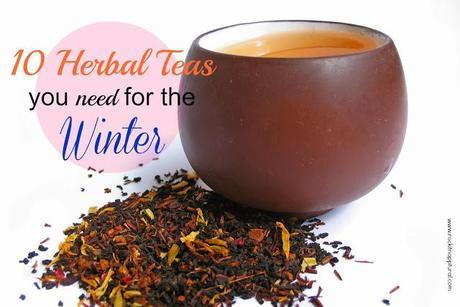 I've never been a big coffee person. I prefer a cup of hot, soothing herbal tea over a cup of coffee any day (Teavana is like my Starbucks). You can drink herbal teas hot or cold, but there's a special warming affect that takes place in your body when drinking hot tea during the colder, winter months.
I've never been a big coffee person. I prefer a cup of hot, soothing herbal tea over a cup of coffee any day (Teavana is like my Starbucks). You can drink herbal teas hot or cold, but there's a special warming affect that takes place in your body when drinking hot tea during the colder, winter months. Here are 10 herbal teas that you should be drinking this winter, and why...
Black Tea
Black tea, which actually comes from green tea leaves that oxidize into a brownish/black color, is a great alternative for coffee lovers. It contains a large quantity of caffeine and is known for boosting energy levels. Black tea has also been known to increase the heart rate and contains antioxidants called polyphenols, which protects the cells in your body. Research has shown that black tea may help to reduce the risk of ovarian cancer and clogged arteries. Black tea can also be used directly on the hair, read more here.
Echinacea Tea
Echinacea is an herb that has a complex mix of active substances. It is widely known for boosting the immune system, and is commonly used to fight cold and flu symptoms. Studies have also shown that it increases the number of white blood cells in the body. Echinacea is also used for reducing inflammation and pain.
Green Tea
Green tea has many uses and benefits for the hair, body and the skin. Based on several studies, it has been proven to help battle free radicals, brighten skin, reduce the risk of several types of cancers, aid in weight loss and digestion, lower blood-sugar levels, and reduce the risk for heart disease. Green tea can be consumed several times daily, and would also help to reduce high cholesterol, high blood pressure and aid the body in eliminating toxins. Green tea can also be used directly on the hair.
Ginger Root Tea
Ginger tea is great for soothing and warming stomach issues, from anything to morning sickness, motion sickness, bloating, nausea, diarrhea, loss of appetite and even gas. In fact, one of the substances in ginger is used to make various over-the-counter antacids, laxatives and anti-gas medications. You can also enjoy a cup of ginger tea to soothe menstrual cramps, fight upper-respiratory infections and battle a common cold
Hibiscus Flower Tea
Another personal favorite, Hibiscus tea has a tart, crisp flavor that contains powerful antioxidants. Its used for treating cold symptoms, heart and nerve disease, upper respiratory infections, stomach discomfort, and for eliminating nasty phlegm. Hibiscus tea also works to relieve bloating caused by water weight gain that may be caused by an over-consumption of sodium.
Licorice Root Tea
Licorice root tea has a very distinctive flavor (think black jelly beans) and is excellent for the digestive system and healthy liver function. Licorice root is anti inflammatory, and has slight estrogenic properties which make it ideal in minimizing menstrual cramping, bloating and various PMS symptoms. Studies have also show that it has been successful in treating eczema, skin rashes, psoriasis, and itchy and dry skin. Additionally, licorice root has also been used to treat infertility in women caused by polycystic ovary syndrome.
Rose Hips Tea
Rose Hips derive from the rose plant, just below the petals of the flower. Fresh rose hips contain a significant amount of vitamin C, which makes it essential for fighting cold, flu and vitamin C deficiencies. Rose hips tea also has mild diuretic and laxative capabilities, and is also used to improve, and relieve the symptoms of kidney disorders, or to help in the case of mild constipation. There is also a good portion of vitamin A in rose hips which is beneficial to the immune system.
Rosemary Tea
Rosemary is an all-natural tonic and helps to improve the overall health of the brain, heart, liver, and skin cells. It is filled with powerful antioxidants and contains a slew of vitamins such as beta-carotene, vitamins A, B1, B2, B3, B6, B12, C, D, E and K. If you;re the type of person who gets sick every winter, Rosemary is for you. Rosemary tea has bacteria fighting properties and helps battle infections, and build immunity to help prevent frequent infections.
Sorrel Tea
Sorrel tea contains a high dose of vitamins A, B9, and C. It is also a good source of vital minerals such as potassium, magnesium, sodium, iron, and calcium. Sorrel is also used for people who suffer from pain or swelling of the nasal passages, inflammation of the respiratory tract, or for reducing mucous and phlegm. Because sorrel has strong laxative and diuretic properties, be careful of over-consumption.
What are some of your favorite teas to drink for the winter?
Source 1 | Source 2 | Source 3 | Source 4

